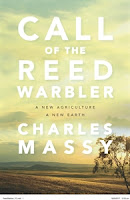 In the October edition of the North Melbourne Books newsletter we talk to farmer, environmentalist and writer Charles Massy about his new book, The Call of the Reed Warbler. In this remarkable book, Massy argues for five regenerative landscape functions to restore life and health to the soil: solar, water, soil, dynamic eco-systems and the human-social.
In the October edition of the North Melbourne Books newsletter we talk to farmer, environmentalist and writer Charles Massy about his new book, The Call of the Reed Warbler. In this remarkable book, Massy argues for five regenerative landscape functions to restore life and health to the soil: solar, water, soil, dynamic eco-systems and the human-social.It's hard not to think that Call of the Reed Warbler is destined to become a classic of its kind. Massy has clearly spent years thinking and talking about the land and our relationship to it. His book has echoes of Thoreau's Walden, Rachel Carson's Silent Spring and Jared Diamond's Collapse.
To view the latest edition of the North Melbourne Books newsletter, click here. To sign up for our monthly newsletter, click here.
North Melbourne Books talks to Charles Massy
North Melbourne Books: In Call of the Reed Warbler, you argue that industrial farming methods have seriously degraded our soils. To revive the land we need to embrace five regenerative landscape functions: solar, water, soil, dynamic eco-sytems and the human-social. The book feels like a passionate labour of love, with its impressively rich mixture of research , farmer interviews, personal stories and an appreciation of the natural history literature. What was the writing process like?
Charles Massy: The writing process – aside from the usual blood, sweat and tears etc. – was more enjoyable than the other books I have done, which were a bigger slog. This is because – and as you allude to – it was a passionate labour of love, and I was able to write creatively about landscape, imagery, feelings etc. in those aspects of my book that were more personal, and also about the Australian landscape. The passion also came through because of the urgent issues facing our planet’s systems and humanity.
NMB: There's a wonderful story in your book about a mysterious kurrajong tree on your property and how it got there. It took Aboriginal Ngarigo elder, Rod Mason, to properly "read" the tree and tell you it's long history. How much has Aboriginal knowledge influenced your thinking?
CM: Aboriginal thinking has been very significant. Through having Rod Mason and others teach me their ancient view of our landscape and its stories, the scales have come off my eyes as to its deeper, cultural and more ancient nature and stories. Combined with other writers like Bill Gammage, Bruce Pascoe, and friends like Prof. Kerry Arabena (Prof. Indigenous Health at Melbourne Uni), knowledge about 60 millennia or more of indigenous management and caring/interacting/surviving in Country completely changed my understanding of this land, how it functions, and how we current land managers are inheritors of a great and long tradition that sought to maintain and regenerate ‘Country’.
NMB: You make a compelling argument that our thoughtless modern economy has created an "Industrial Mind". We think it quite normal to intensively spray the land with herbicides and pesticides. Instead we need to cultivate an "Emergent Mind", one that uses technology and science, but also allows nature space to find its own self-expression. How do you we start to take those first steps?
CM: Taking those first steps begins with re-engaging with nature; getting our hands in the soil; growing our own vegies; getting involved with the new food movements and healthy food; allowing children to get outdoors, climb rocks and trees again and discover the wonder of the outdoors and beautiful birds and so on. It has to be a tactile, sensory engagement before the heart can respond. Other first steps involve becoming better informed about the Anthropocene issues, and coming to understand how self-organizing systems work – and their amazing and wonderful attributes.
NMB: Call of the Reed Warbler has echoes of Rachel Carson, Thoreau and Jared Diamond. Which writers inspire you?
CM: Those writers you mentioned; plus people Aldo Leopold; Annie Dillard, Nicholas Rothwell; Bill Gammage & Bruce Pascoe; poets like the Tang Chinese poets, Basho and other Haiku poets; Les Murray of course, and many others.
NMB: What books are you enjoying reading at the moment?
CM: Don Watson’s The Bush; Clive Hamilton’s Defiant Earth; Ian Argus’ Facing the Anthropocene; Charles Montgomery’s Happy City; and Nicholas Rothwell’s Wings of the Kite-Hawk.
Call of the Reed Warbler: A New Agriculture, A New Earth, by Charles Massy. Published by UQP. $39.95

No comments:
Post a Comment